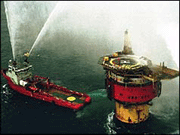 |
| Shell ships use water
cannons against Greenpeace activists on board the
rig |
|
1995: Shell makes dramatic
U-turn |
Artificially 1969:
The Oil giant
Shell has given in to international pressure and abandoned plans to dump
its Brent Spar oil rig at sea.
But the company's decision, which came just hours before the
14,500-tonne structure was due to be submerged under the sea off the west
coast of Scotland, has left the government in an embarrassing situation.
Just yesterday in the House of Commons, Prime Minister John Major was
defending the plans to dispose of the structure 6,000ft (1,828m) under the
sea.
But a spokesperson for environment group Greenpeace, which has been
campaigning against the proposals for several weeks, hailed Shell's
decision a victory.
"It is a victory for us but more importantly it is a victory for all
the people who campaigned against the dumping," she said.
Marine pollution
Greenpeace activists claim that dumping the structure under the sea
would release highly toxic chemicals into the water and cause widespread
marine pollution.
Its ship, the Altair, has been shadowing tugs pulling Brent Spar to its
North Atlantic dumping ground since it set off last week.
Just three days ago two activists boarded the installation from a
helicopter and vowed to remain "until the death" in an attempt to prevent
the deep-sea disposal going ahead.
Thousands of British motorists have also boycotted the company's
filling stations in protest and Shell was forced to call off its
environmental awards ceremony due to be held on 21 June.
In a statement Shell UK denied that Greenpeace's actions had forced the
U-turn, but conceded that the company had found itself in an "untenable
position" due to widespread objections from international governments.
The statement said: "Shell UK has decided to abandon deepwater disposal
and seek from the UK authorities a licence for onshore disposal.
"Shell UK Ltd still believes that deep water disposal of the Brent Spar
is the best practicable environmental option, which was suported by
independent studies."
Michael Heseltine, President of the Board of Trade, criticised the
company for relenting.
He said: "I think they should have kept
their nerve and done what they believed was right."
The fate of the concrete and steel Brent Spar rig which, for 15 years,
served as a crude oil storage tank and loading buoy, is now unknown.
But energy minister Tim Eggar warned that the government would not
automatically give permission for it to be broken up on land.
He said: "If Shell wishes to propose an alternative course of action
the government will consider it.
"That proposal will have to contain solutions to the problems which led
to the identification of deep sea disposal as the best practicable
environmental option.
"Until solutions acceptable to the government departments concerned
have been found, no agreement on abandonment will be
available."